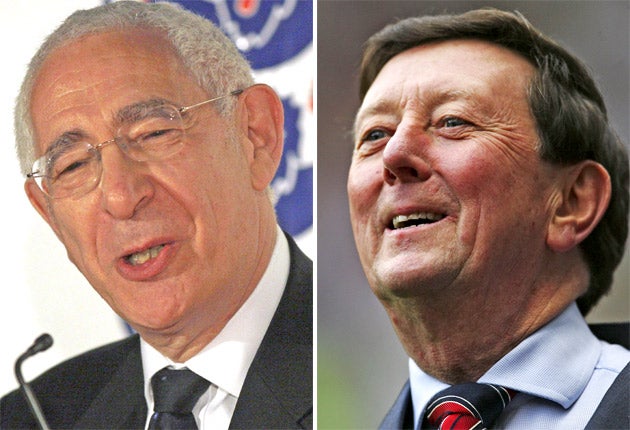Why Triesman happily put boot into FA's 'macho culture'
Sir Dave Richards blamed for aggressive approach that rejects any notion of reform

There are two names, according to Lord Triesman, that bring fear to the featureless corridors that wind around the back of Wembley and house the offices of the Football Association. One is Burns, the other Richards. There may now have to be another added: Triesman himself.
It was in 2008 that Triesman was appointed the first independent chairman of the Football Association, then residing in the rather more salubrious surroundings of Soho Square. And according to the Labour peer their move from the centre of London to the bleak home of the national stadium, itself a splendid memorial to a project that spun out of control, has coincided with a growing failure to provide the central form of governance in the English game. They have, claims Triesman, ceded real power to the Premier League, even more so after his attempts to reverse that failed.
Triesman was far from the first to seek to reform the FA's structure, with its awkward and uneasy split between the Premier League giants and the county set, the representatives of the grass roots. On one side of the FA board table sit Sir Dave Richards, who is also chairman of the Premier League and one of the game's power brokers, Manchester United's David Gill and the influential Phil Gartside of Bolton; facing them are the likes of Michael Leggett of the Worcestershire FA and Michael Game of their Essex counterparts, with representatives of the Football League making up the dozen. It is, according to Triesman, a body fearsomely ruled by Richards. The "language of the dressing room" in a "very, very macho culture" holds sway.
Triesman argues that it could have been different if Lord Burns' proposals had been adopted – as did the man himself yesterday, when the two lords and Graham Kelly, the chief executive of the FA at the Premier League's birth, appeared before the Culture, Media and Sport Select Committee in Portcullis House, where the MPs were seated in front of a large blood red canvas that seemed appropriate for the dignified kicking football's governing body was to receive from its former head.
The issues Burns was asked to address included potential conflict of interest among board members, an unrepresentative council and too much power for the Premier League. He addressed them and little happened. "I quickly learnt," joked Triesman yesterday, "never use [Burns'] name in FA headquarters – except as a means of frightening the children."
The reason Burns' reforms failed to lead to change was, according to its author, the notion of "turkeys voting for Christmas." Burns described the make-up of the FA's board as being "like the Financial Services Authority having a controlling interest by the banks and I don't think that would be a satisfactory state of affairs to anybody."
Burns, Triesman and many others want there to be more independent voices on the board, which they hope would have the effect of loosening the Premier League's firm grip on it. Triesman's description of how the amateur members were given a blunt reminder of "where their money came from" to settle one discussion demonstrates precisely where the power lies.
Triesman's initial appointment was received with suspicion by those in the game and he angered the Premier League less than a year into his tenure by criticising the levels of debt its clubs hold. From then on relations between the two bodies were at best uneasy; England's troubled bid for the 2018 World Cup is an obvious example. Richards' resignation from the bid team at a key moment was a cruel blow.
Tales of Richards' management methods were happily lapped up by the MPs over the course of the hour and 20 minutes in the Wilson Room. One quoted the former chairman of Sheffield Wednesday giving a typically robust response to the allegation that he had threatened to withdraw the Premier League clubs from the FA Cup. "Bollocks," Richards was quoted as saying. Did Lord Triesman, wondered the MP, recognise the incident. Triesman smiled. "That," he said, "has a terrible ring of authenticity."
Football's big rivalry: The two key players
Sir Dave Richards
Chairman of the Premier League and member of the FA board. The former Sheffield Wednesday chair has long been one of the key power brokers in the English game.
Lord Triesman
Former chairman of the FA and was a major figurehead behind the 2018 bid. He quit both roles last May after a newspaper sting, having made significant enemies across the game.
Join our commenting forum
Join thought-provoking conversations, follow other Independent readers and see their replies
Comments